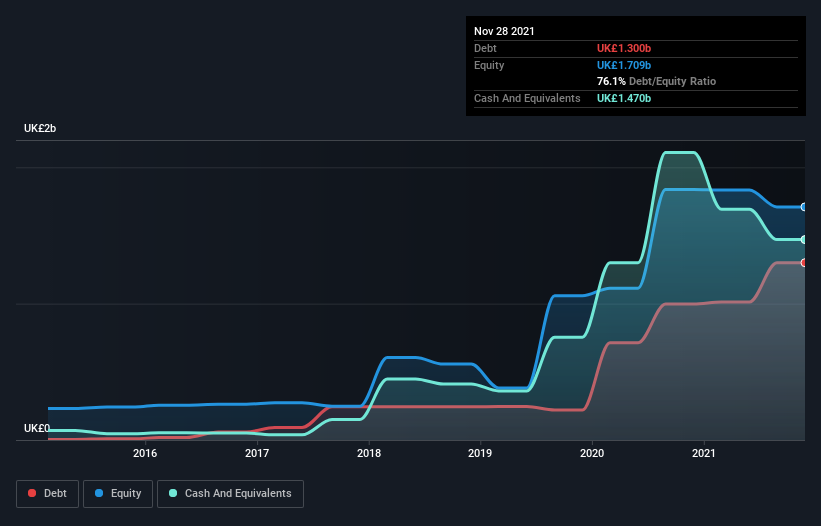Is Ocado Group (LON:OCDO) Weighed On By Its Debt Load?
Legendary fund manager Li Lu (who Charlie Munger backed) once said, 'The biggest investment risk is not the volatility of prices, but whether you will suffer a permanent loss of capital.' So it seems the smart money knows that debt - which is usually involved in bankruptcies - is a very important factor, when you assess how risky a company is. As with many other companies Ocado Group plc (LON:OCDO) makes use of debt. But is this debt a concern to shareholders?
When Is Debt Dangerous?
Debt is a tool to help businesses grow, but if a business is incapable of paying off its lenders, then it exists at their mercy. Part and parcel of capitalism is the process of 'creative destruction' where failed businesses are mercilessly liquidated by their bankers. However, a more frequent (but still costly) occurrence is where a company must issue shares at bargain-basement prices, permanently diluting shareholders, just to shore up its balance sheet. By replacing dilution, though, debt can be an extremely good tool for businesses that need capital to invest in growth at high rates of return. The first thing to do when considering how much debt a business uses is to look at its cash and debt together.
View our latest analysis for Ocado Group
What Is Ocado Group's Debt?
The image below, which you can click on for greater detail, shows that at November 2021 Ocado Group had debt of UK£1.30b, up from UK£997.4m in one year. But it also has UK£1.47b in cash to offset that, meaning it has UK£169.8m net cash.
How Strong Is Ocado Group's Balance Sheet?
According to the last reported balance sheet, Ocado Group had liabilities of UK£467.0m due within 12 months, and liabilities of UK£2.21b due beyond 12 months. Offsetting these obligations, it had cash of UK£1.47b as well as receivables valued at UK£324.2m due within 12 months. So its liabilities total UK£880.2m more than the combination of its cash and short-term receivables.
Since publicly traded Ocado Group shares are worth a very impressive total of UK£9.63b, it seems unlikely that this level of liabilities would be a major threat. However, we do think it is worth keeping an eye on its balance sheet strength, as it may change over time. Despite its noteworthy liabilities, Ocado Group boasts net cash, so it's fair to say it does not have a heavy debt load! When analysing debt levels, the balance sheet is the obvious place to start. But ultimately the future profitability of the business will decide if Ocado Group can strengthen its balance sheet over time. So if you're focused on the future you can check out this free report showing analyst profit forecasts.
In the last year Ocado Group wasn't profitable at an EBIT level, but managed to grow its revenue by 7.2%, to UK£2.5b. We usually like to see faster growth from unprofitable companies, but each to their own.
So How Risky Is Ocado Group?
By their very nature companies that are losing money are more risky than those with a long history of profitability. And we do note that Ocado Group had an earnings before interest and tax (EBIT) loss, over the last year. Indeed, in that time it burnt through UK£707m of cash and made a loss of UK£223m. While this does make the company a bit risky, it's important to remember it has net cash of UK£169.8m. That kitty means the company can keep spending for growth for at least two years, at current rates. Summing up, we're a little skeptical of this one, as it seems fairly risky in the absence of free cashflow. There's no doubt that we learn most about debt from the balance sheet. However, not all investment risk resides within the balance sheet - far from it. Be aware that Ocado Group is showing 2 warning signs in our investment analysis , you should know about...
If, after all that, you're more interested in a fast growing company with a rock-solid balance sheet, then check out our list of net cash growth stocks without delay.
Have feedback on this article? Concerned about the content? Get in touch with us directly. Alternatively, email editorial-team (at) simplywallst.com.
This article by Simply Wall St is general in nature. We provide commentary based on historical data and analyst forecasts only using an unbiased methodology and our articles are not intended to be financial advice. It does not constitute a recommendation to buy or sell any stock, and does not take account of your objectives, or your financial situation. We aim to bring you long-term focused analysis driven by fundamental data. Note that our analysis may not factor in the latest price-sensitive company announcements or qualitative material. Simply Wall St has no position in any stocks mentioned.

